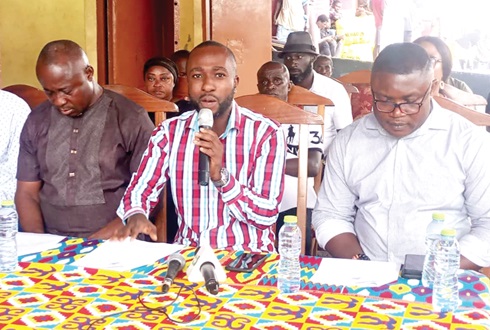
Reports in Europe on used clothing misleading — Association
The Ghana Used Clothing Dealers Association (GUCDA) has called on the government not to yield to pressure from any quarters, local or international, to impose a ban on the importation of used clothing.
It said the recent impression being created in the international community that used clothes had become waste in Ghana was misleading and aimed at tarnishing the image of the country.
Per its research at a huge dump site at Nsawam, for instance, it said waste material causing environmental problems included plastic, paper, and metals, with cotton items being the last.
It said there was no way that dealers of used clothing would spend millions of Ghana Cedis to import waste into the country.
Addressing journalists in Accra yesterday, the General Secretary of the GUCDA, Edward Atobrah Binkley, said used clothing had provided direct employment to 2.5 million people while another 2.5 indirectly derived their livelihood from it.
"In recent weeks, there had been a surge of misinformation surrounding the second-hand clothing trade in Ghana, particularly regarding the alleged $15 million funding from Shein to the OR Foundation.
Reports
“Reports circulating in Europe and other parts of the world suggest that the second-hand clothing trade is solely responsible for environmental damage in Ghana and that its existence is a major detriment to the economy," he said.
Mr Binkley said, "these claims are not only misleading but are also part of a broader agenda by the OR Foundation to dismantle a long-standing and essential trade that provides economic benefits to millions of Ghanaians".
The used clothing trade, popularly referred to as “Obroni Wawu”, was a critical component of Ghana’s informal economy and it provided income and livelihood for thousands of traders, wholesalers and market vendors.
“Indirectly, it supports millions of individuals who rely on affordable clothing to meet their basic needs. Ghana’s second-hand clothing markets have also fostered entrepreneurship and local businesses that repair, refurbish and recall items, contributing to employment opportunities and a robust local economy,” he said.
Contrary to the narrative that the second-hand clothing trade was solely responsible for environmental problems, Mr Binkley said the industry had the potential to be part of the solution, adding that by focusing on recycling, repurposing and upcycling clothing, the trade could reduce the environmental burden while supporting sustainable development.
“Efforts to develop waste management strategies, in partnership with the second-hand clothing trade, can lead to innovative ways of reducing waste and improving environmental outcomes,” he said.
OR Foundation
He questioned the motive of OR Foundation “which has received significant financial backing from international corporations such as Shein” and that the fact that it had accepted $15 million from Shein raises concern about its true agenda.
“The irony of Shein funding an initiative purportedly aimed at solving the issue of second-hand clothing in Ghana cannot be overlooked. It is essential to critically assess whether this partnership truly seeks to benefit Ghanaians or whether it is driven by a broader agenda to stifle competition in favour of fast fashion producers,” he emphasised.
Mr Binkley said the campaign by OR Foundation was not about sustainability or environmental justice but rather, it was part of an agenda that sought to undermine a key sector of the economy.
He said the second-hand clothing trade represented a form of circular economy, one that recycled goods and offered affordable fashion alternatives.
“By attempting to vilify this industry, the OR Foundation threatens the livelihoods of millions of Ghanaians while advancing the interest of large fashion corporations looking to monopolise markets and perpetuate fast fashion consumption,” he said.
Transparency
He, therefore, urged the foundation to be transparent about its intention and the source of funding, adding that the country deserved solutions that prioritised local economic growth, environmental sustainability and community-driven initiatives.
“The second-hand clothing trade is a complex industry that cannot be reduced to a one-dimensional narrative of harm. Instead, we advocate policies and partnerships that balance economic and environmental interests while supporting Ghanaians’ right to earn a living,” he said.
The GUCDA therefore called on the government, stakeholders and the international community to collaborate in crafting sustainable solutions that include all parties, particularly the traders, workers and citizens who depend on the industry.
